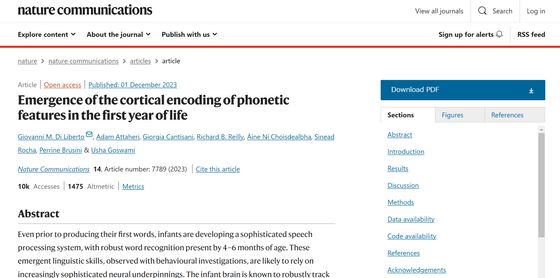Singing songs to infants is essential for learning language; infants first understand language through rhythm rather than individual sounds

A research team at the University of Cambridge has announced that singing songs is important for infants to learn language because infants' language acquisition is not through phonemes but through ``rhythm'', which is the pitch and tempo of sounds. .
Emergence of the cortical encoding of phonetic features in the first year of life | Nature Communications

Singing to babies is vital to help them learn language, say scientists | Language | The Guardian
https://www.theguardian.com/science/2023/dec/01/singing-to-babies-is-vital-to-help-them-understand-language-say-scientists
Until now, it was thought that infants learn each sound element and then combine them to form words. To confirm the facts, the research team showed a movie of an elementary school teacher singing 18 nursery rhymes to 50 infants aged 4, 7, and 11 months, and observed their brain activity during that time.
According to the research team's analysis, infants' brains can recognize words by the age of 4 to 6 months even before they utter words. However, it has been stated that children do not process phonemes, the smallest units of sound, until they are 7 months old, and instead recognize words based on the ``rhythm'' of the pitch and tempo.

Rhythm is an important component of language in all languages, and infants are able to guess the breaks between words based on rhythmic patterns. In addition, infants use rhythmic information as a base, like a scaffold or skeleton, and use vocal information as supplementary information to recognize words. 'All babies are exposed to beat structures with strong syllables at a pace of 120
Infants' brains gradually begin to process phonemes from around 7 months old, but the pace of increase in the number of phonemes that can be processed is slow, and it is said to be too slow to form the basis of language. The research team said, ``We believe that the rhythmic information of spoken words supports the development of infants' language systems behind the scenes,'' and added, ``Parents should talk to their babies as much as possible, sing to them, and then listen to children's songs, such as nursery rhymes. 'Baby-friendly speaking can make a difference in language acquisition outcomes.'

This research is part of the Baby Rhythm Project, which investigates how language is related to dyslexia and developmental language disorders. He also pointed out that the problem may not be a processing problem, but a problem with rhythm perception.
Related Posts:







